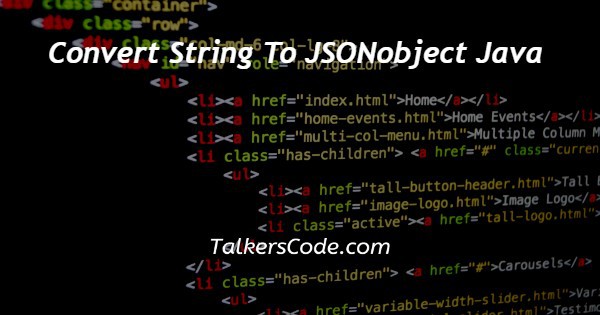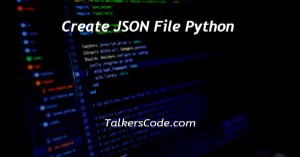Convert String To JSONobject Java
Last Updated : Mar 11, 2024
IN - Java JSON | Written & Updated By - Riya

In this article we will show you the solution of Convert string to jsonobject java, working with JSON data in Java applications is a regular activity. A popular lightweight data interchange format for transferring data between systems and languages is JSON (JavaScript Object Notation).
It is frequently necessary when working with JSON to translate a stringrepresentation of the data into a Java object for further processing.
Java's parsing of JSON strings results in the creation of related JSONObject instances that represent the JSON structure when converting a string to a JSONObject.
For easy parsing and manipulation of JSON data, popular libraries like Jackson, Gson, and JSON.simple provide the JSONObject class.
Three steps are normally required to convert a string to a JSONObject: first, parse the JSON string using a parser you write yourself or one given by a library; second, extract the values you want from the parsed JSON; and third, create a JSONObject instance to hold the values you extracted.
We'll talk about the converted string to jsonobject in Java concept now.
Step By Step Guide On Convert String To JSONobject Java :-
import com.fasterxml.jackson.databind.JsonNode;
import com.fasterxml.jackson.databind.ObjectMapper;
import com.fasterxml.jackson.databind.node.ObjectNode;
public class StringToJSONObjectExample {
public static void main(String[] args) {
String jsonString = "{\"name\":\"Magan\", \"age\":30, \"city\":\"New York\"}";
try {
ObjectMapper objectMapper = new ObjectMapper();
JsonNode jsonNode = objectMapper.readTree(jsonString);
ObjectNode jsonObject = objectMapper.createObjectNode();
convertJsonNodeToJsonObject(jsonNode, jsonObject);
System.out.println(jsonObject.toString());
} catch (Exception e) {
e.printStackTrace();
}
}
private static void convertJsonNodeToJsonObject(JsonNode jsonNode, ObjectNode jsonObject) {
for (JsonNode field : jsonNode) {
String fieldName = field.fieldNames().next();
JsonNode fieldValue = field.get(fieldName);
if (fieldValue.isObject()) {
ObjectNode nestedObject = jsonObject.putObject(fieldName);
convertJsonNodeToJsonObject(fieldValue, nestedObject);
} else {
jsonObject.set(fieldName, fieldValue);
}
}
}
}
- You can see that we wrote the Java code to convert a string to a JSON object in this place.
- To get the relevant classes from the Jackson library, we include the imports that are required.
- The class StringToJSONObjectExample is intended to serve as the program's entry point.
- We create a JSON string and apply it to the jsonString variable inside the main method.
- The name, age, and city fields of the object represented by this JSON string are all present.
- The ObjectMapper instance objectMapper is created. Jackson's ObjectMapper class is in charge of processing and mapping JSON data.
- The JSON string is parsed into a JsonNode object called jsonNode using the ObjectMapper's readTree function.
- To hold the transformed JSON object, we build an empty ObjectNode called jsonObject.
- To turn the jsonNode into a JSONObject, we invoke the convertJsonNodeToJsonObject function. This function iterates through the fields in the jsonNode and takes the jsonNode and jsonObject as inputs.
- We use a foreach loop to repeatedly traverse through the fields of the jsonNode inside the convertJsonNodeToJsonObject function. Each field in the jsonNode is represented by the field variable.
- Using field.fieldNames(), we can retrieve the field name.and save it in the fieldName variable using next().
- Using field, we can get the value of the field.fieldValue should be set to the value returned by get(fieldName).
- Using fieldValue, we determine the type of the field value.isObject().
- If yes, we use jsonObject to build a new ObjectNode called nestedObject and add it to the jsonObject.putObject(fieldName).
- The nested object is then converted by repeatedly invoking the convertJsonNodeToJsonObject function.
- If the field value is a primitive value (a text, number, boolean, etc.), it is not an object.
- In this instance, we use the jsonObject.set(fieldName, fieldValue) method to add the field to the object.
- We print the transformed jsonObject to the console using System.out after iterating through each field in the jsonNode.println(jsonObject.toString()).
- To handle any exceptions that might come up while processing or converting JSON, we offer exception handling.
- If an exception occurs, we use e.printStackTrace() to print the stack trace to the console.
Conclusion :-
As a result, we have successfully mastered the Java notion of string to JSON object conversion.
Using the ObjectMapper class, we also discovered how to parse the JSON string into a JsonNode and then recursively traverse through its properties to create a JSONObject.
We can manage nested objects with this method, and we can extract both simple and complex values.
I hope this article on Convert string to jsonobject java helps you and the steps and method mentioned above are easy to follow and implement.













